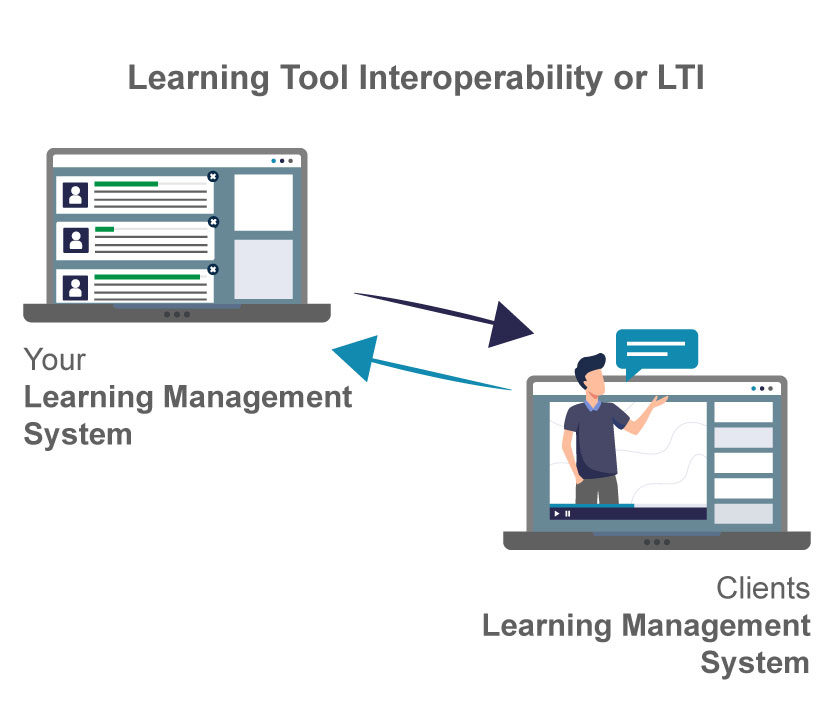Learning Tool Interoperability or LTI
Learning Tool Interoperability (LTI) is a system or protocol that allows two compatible Learning Management Systems (LMS’s) to work together. It allows one system to hold the content or course material (the ‘Host’) and another (the ‘Receiver’) to receive and distribute the content or course to its students.
The Receiver has access to the Hosts material that it is granted permission too, and is responsible for enrolling their user in the course via their own LMS. When an enrolment is made, an enrolment record is made in both systems.
When a student completes a course or component, the completion record is updated in both systems.

By maintaining control over their content the Host can restrict access at the end of a period (say unlimited access for year) or invoice at the end of each period for the enrolments made during that time (say each month). This avoids the position of trying to guess in advance what student enrolment numbers might take place over a set period or trying to restrict access to IP after the licensing period for expired.
There are a number of benefits of utilising the LTI functionality of your LMS’s including:
For the Receiver:
Receivers are able to gain access to other peoples course material and maintain record of the training events inside their own system.
For Hosts:
Hosts can distribute their content to third parties, but still control its distribution. The Host is also able to maintain records of training on their system (in addition to the Receivers own record).
The Host is also able to restrict or remove access at anytime, or see how many enrolments a Receiver has made (for billing purposes for example).
For Students:
Students only need to log into only one system (their own) and are able to do all their training in a familiar location, regardless of where the course is hosted or distributed from. This gives them a single learning portal for all their training.
For Administrators:
Administrators can compile more interactive and engaging courses, or access material that best suits their needs from a range of different locations, then deliver it seamlessly as part of a single course in their own environment.
Administrators also have full (and permanent) records of training events and activity.
Content providers are using this model where they license content for a set period of time or want to invoice based on the number of actual users or enrolments. By utilising an LTI connection instead of handing over the IP, the Content provider remains in control of when and where their material is distributed as well as having accurate and transparent reporting for all parties involved.
Setting up a course via an LTI connection is relatively simple and requires a URL, Secret Key and Key information. This information is generated by the Hosts LMS for each course and for each Receiver.
The Receiver then enters these details in their LMS and configures the recording and reporting as they require.
The Hosts own reporting and recording are unaffected by the Receiver’s choices, as these records are maintained in the Hosts own Learning Management System.
As these two system are now working together as one, access to the course material, training event recordings and reporting happens in real time in both locations.
There are no limits to the number of Receivers a Host can have, which means if you are a content producer, you can distribute your content to multiple Receivers. Further, as each Receiver has a unique relationship with the Host, the Host controls which material is available in each situation.
This means the Host may choose to make Course A available to Receiver 1, and Course B available to Receiver 2. The Receivers have no relationship with each other by way of their relationship with the Host. Even if they are accessing the same course material.
Further, as the Host and content provider if you update or make changes to your course material, any changes you make in your system will automatically be applied to the Receivers content (say fixing a spelling mistake or typo).
Or if you are a Receiver, there is no limit to the number of Hosts you can receive material from. In fact, in some cases, a Receiver may have different Hosts material in a single course proving the choice to mix and match your ‘content’ providers, whilst providing a seamless experience to your students and users.
Moodle and the OTrainU LMS use the latest LTI protocols and can be used to connect with other LTI enabled systems.
For more information on Learning Tool Interoperability or any other online training questions or needs, please contact our office on
07 3040 3310.
